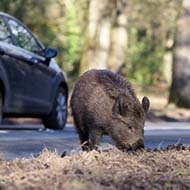Forest of Dean visitors urged not to feed wild boar

"If African Swine Fever arrived in the Forest of Dean, it would have a devastating impact on our pigs and pig keepers" - Richard Irvine, deputy chief veterinary officer.
Visitors and residents to the Forest of Dean are being urged not to feed wild boar or drop food in a bid to prevent an outbreak of African Swine Fever (ASF).
The call from The Animal and Plant Health Agency (APHA), Forest of Dean District Council and Forestry England comes amid a rise in reported cases of ASF in wild boar across Europe.
Authorities are particularly concerned about the increase in numbers of people going on holiday in the UK, and that some visitors may not properly dispose of their food waste.
“If African Swine Fever arrived in the Forest of Dean, it would have a devastating impact on our pigs and pig keepers. We regularly test our contingency plans to ensure that we are ready to respond to potential future disease outbreaks,” commented UK deputy chief veterinary officer Richard Irvine.
“We all need to do our bit to help stop animal diseases spreading to this country. The main way that you can help is by not bringing any pork products back to the UK and ensuring that you dispose of leftovers and food waste in secure bins that wildlife cannot access.”
While ASF is harmless to humans, it is a severe disease of wild boar and pigs and has considerable production and economic consequences for the swine industry. In recent years, ASF has spread throughout parts of Africa, Eastern and Central Europe and Asia.
Although there have been no confirmed cases of ASF in the UK, the risk of the disease is considered to be ever-present. It can survive for many weeks in pork meat and pork products, and the most likely way it could enter the country is by people bringing back such products from an affected country.
“We are grateful to live in a beautiful and culturally rich part of England. It is important that we preserve our environment and proactively prevent any challenges to our individual and collective enjoyment of these natural resources,” said Paul Hiett, deputy leader of the Forest of Dean District Council.
“Join us and play your part to help prevent the spread of African Swine Fever to the wildlife in our beloved forests. Secure waste bins are provided, please put your food waste in them. Together we can help to maintain a healthy forest and wildlife.”



 The RCVS has announced a new version of its 1CPD mobile app, with enhanced features for veterinary surgeons and veterinary nurses to record their continuing professional development.
The RCVS has announced a new version of its 1CPD mobile app, with enhanced features for veterinary surgeons and veterinary nurses to record their continuing professional development.